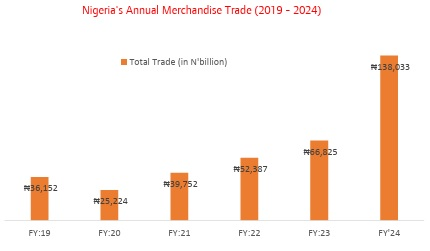Nigeria’s total foreign trade hit ₦138.03 trillion in 2024, marking a 106.6% increase from the ₦66.83 trillion recorded in 2023. This remarkable growth was driven by the depreciation of the naira and a rise in exports.
The latest data from the National Bureau of Statistics (NBS) shows that exports stood at ₦77.4 trillion, outpacing imports of ₦60.6 trillion. This led to a trade surplus of ₦16.85 trillion, a 230.5% jump from ₦5.10 trillion in 2023.
“A larger trade surplus will contribute to a healthier current account balance in 2024,” analysts suggest, highlighting the role of crude oil exports in Nigeria’s economy.
Naira Depreciation Fuels Export Growth
In 2024, the naira lost over 41% of its value, making Nigerian goods cheaper and more competitive globally. Crude oil remained the backbone of exports, accounting for ₦13.78 trillion, or 68.87% of total exports in Q4 2024.
Non-crude exports contributed ₦6.23 trillion, with non-oil products making up ₦2.84 trillion or 14.20% of total exports. Despite strong export performance, foreign exchange pressures remain a risk, particularly for the services sector.

On the import side, Nigeria spent ₦16.59 trillion in Q4 2024, a sharp 83.24% rise from ₦9.05 trillion in Q4 2023. Key imports included mineral fuels (₦4.79 trillion), machinery and transport equipment (₦4.51 trillion), and chemicals (₦2.61 trillion).
Nigeria’s Major Trade Partners
Europe led as Nigeria’s top export destination, receiving ₦8.67 trillion worth of goods, followed by Asia (₦5.56 trillion) and America (₦3.52 trillion). Within Africa, Nigeria exported ₦2.04 trillion worth of goods, with ECOWAS countries receiving ₦1.18 trillion.
On the import side, Asia dominated, supplying ₦8.87 trillion worth of goods, followed by Europe (₦5.29 trillion) and America (₦1.87 trillion). China remained Nigeria’s largest import source at ₦4.61 trillion, followed by India (₦1.89 trillion) and Belgium (₦1.39 trillion).
What’s Ahead
Nigeria’s trade outlook remains positive, with growing crude oil exports and rising refining capacity expected to sustain a trade surplus. However, if imports continue increasing due to improved forex liquidity, the surplus could shrink, impacting the balance of payments.
With forex volatility still a challenge, experts stress the need for policies that stabilize the naira and strengthen Nigeria’s export base beyond crude oil.
Like 👍, Comment, share this article, and Follow us on our social media handles.
Feel free to download and share our Daily Newsletter for Monday, March 10, 2025. 👇







